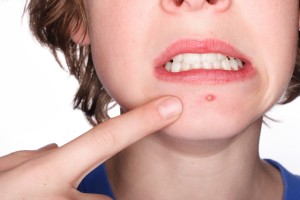Many people experience some level of acne at some point in their lives, but few people realize how complicated a condition it is. It is not something that can be switched on or off. We have many hormones and bodily chemicals that must be in balance and be produced in proper proportions in order to have clear skin. If those hormones and chemicals are out of balance, acne is the result. A very specific diet will be one of your primary tools in fighting acne.
- Cleansing the body and reducing inflammation is one key goal in eating to manage acne. These dietary habits are good for everyone trying to clear their systems of toxins, not just people who struggle with acne. This means consuming cleansing foods containing antioxidants as well as inflammation reducing foods, such as citrus, cinnamon, turmeric, apple cider vinegar, berries, spicy peppers, bell peppers and green tea.
- Aiding the metabolism of fats, proteins, carbohydrates and sugars is another primary diet goal in managing acne. This means eating to aid digestion, process nutrients and vitamins, and limit intake of things that are too high in these substances. Good substances to consume are plain yogurt, flax seeds, whole grains, nuts and legumes, fish oils, vitamin B and D supplements, calcium heavy foods such as kale and milk, avocados, olive oil, lean protein such as turkey and fish, and light carbs and sugars that do not include white flour or refined sugar.
- Eating for balanced hormones is a complicated matter. One can never guess at what their hormone levels are. One does not innately know which hormones they are deficient in and which they have an abundance of. Having said that, there are some herbs and substances, primarily plant based, that are known to have general hormone balancing qualities, such as green tea, saw palmetto, chasteberry, holy basil, white peony, spearmint tea, licorice root, nettle root and dandelion. In addition to these substances, it is wise to check your levels to know for sure, because you may be deficient in iodine, chromium and other bodily chemicals that affect your hormone production and metabolism.

